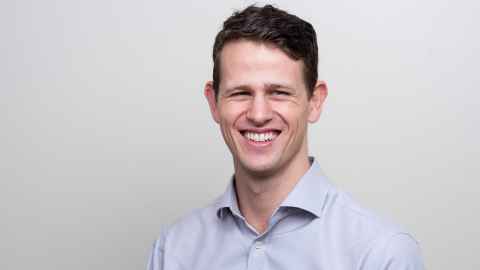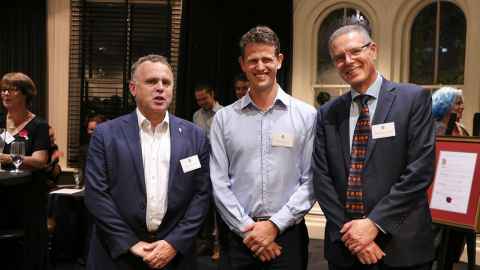An unexpected journey
11 May 2022
Dr Oscar Lyons is the recipient of this year's Sir George Elliot Fellowship. He spoke to us about how the unexpected continues to inspire him.

What made you want to study at the University of Auckland – particularly in the Faculty of Medical and Health Sciences?
I was interested in working in a profession where my work would feel meaningful, as well as academically challenging. Having seen the stress that my mum needed to overcome bringing up me and my three brothers on her own, the job security that medicine comes with was very attractive too.
The University of Auckland had great scholarships available, and staying in Auckland meant that I could continue part-time work as a high school tutor, which helped me to pay my way through university.
What was your favourite thing about your time at the University of Auckland?
He aha te mea nui o te ao? He tangata, he tangata, he tangata.
There were so many things I loved: from friends and Judo through to clinical attachments and patients, being in the Auckland University Medical Students' Association (AUMSA), helping with the Rotary Youth Leadership Awards, and flatting in Grafton.
My favourite part of my time at the University of Auckland, however I look at it, was the amazing people that I was privileged to meet and to work with.
I am hugely grateful to receive the Sir George Elliot Fellowship. The
fellowship has been awarded to recognise the contribution I have made to my communities since graduating.
What do you value most about your time working and studying overseas?
Once I got used to the fact that my days weren’t structured or rostered anymore, I was able to think about how I can have a positive impact through my work, and where I enjoy focusing my energy.
I also did things that I hadn’t had time for while working as a doctor – touring with a semi-professional singing group, starting up a leadership development programme for healthcare professionals, supporting my Rhodes community as a Scholar Programme Facilitator, and travelling in the United Kingdom and Europe.
In some ways I miss starting my day and writing a jobs list and knowing what to expect. But I am also very grateful for the unexpected opportunities and interests that have entered my life, and for the ways that my outlook has been broadened.

Did you always know what you wanted to do for a career, or did your trajectory change? Why?
Throughout high school I planned to study engineering. I went to medical school because I knew that I could credit most of the first year to a Bachelor of Engineering if I decided I hated medicine (I clearly didn’t). On a whim and a recommendation I went on the Rotary Youth Leadership Awards camp during medical school, and as a result ended up becoming more aware of our need for leadership development. I trained and competed in Judo because I loved it. I tutored because I needed the money and because I loved seeing my students developing.
My friend Nick suggested that I apply for the Rhodes Scholarship, which I hadn’t heard of before. The reason I was in a position to apply was not because I had planned it, but rather because whenever I love something and find satisfaction, I can apply myself wholeheartedly. This approach has led to twists and changes, and has also opened up opportunities for me along the way that I could not have planned.
I’m always looking for opportunities to bring my leadership development
work back to New Zealand and to benefit my communities here.
You’ve been awarded the Sir George Elliot Fellowship. Why are you receiving this award and what does it mean to you?
I am hugely grateful to receive the Sir George Elliot Fellowship. The fellowship has been awarded to recognise the contribution I have made to my communities since graduating. In particular I understand it has been awarded to me for advocating for and supporting evidence-based leadership development for healthcare professionals in the United Kingdom, New Zealand and Australia, as well as for the ways that I have continued to be involved in my communities through sports and music and community leadership. The Fellowship is also a chance to formally thank some of the people who have made it possible for me to get here, through their support and encouragement and advice.
What is the greatest highlight of your career so far?
In terms of career milestones, some of my highlights have been moving to Gisborne and starting work as a doctor, winning a Rhodes Scholarship, publishing my first academic paper with the South Auckland Clinical School, successfully defending my doctoral thesis, and being appointed as the Programme Director for the new Master of Health Science in Global Healthcare Leadership at Oxford University.
Perhaps more personally though, I think my greatest highlight has been seeing the growth of the Emerging Leaders Programme I started at Oxford University Hospitals in 2017. Since the first cohort, we have come from 13 applications for 25 places on a cohort through to more than 100 applicants across medicine, nursing and allied health. The majority of the now nearly 150 graduates have contributed to teaching and mentoring for cohorts that have come after them. It has been an absolute pleasure seeing what they have all achieved, and the love and energy that they have put back into the programme.
You don’t need to plan things out from the start. Look for something that you are passionate about, and put all your love and energy into getting there.
What’s next for you? Where do you see yourself in the next one, five and ten years?
I have just started working on Oxford University’s new Master of Science in Global Healthcare Leadership. I also work with the United Kingdom's Faculty of Medical Leadership and Management, and do some consulting work on leadership development programmes in healthcare through Thrum Leadership Ltd and Teams and Leadership Ltd. My focus is on supporting evidence-based leadership development in healthcare through design, delivery, evaluation and improvement.
I don’t think I will ever hold a full-time clinical role – it feels like it would be a waste of the skills that I have developed through my doctorate not to use them directly. I do love teaching, and improving leadership development programmes. If I get an opportunity to work more in this, academically or professionally, there’s a good chance I will.
I’m always looking for opportunities to bring my leadership development work back to New Zealand and to benefit my communities here. I don’t know what those opportunities might look like until they come my way. If anyone is interested in improving leadership development in New Zealand, through programmes or clinical training or otherwise, I would love to help.
What advice would you give to prospective students who are interested in a similar career path to yours?
Whenever I ask someone who inspires me to speak about their career, they always admit that there were unexpected turns along their journey.
You don’t need to plan things out from the start. Look for something that you are passionate about, and put all your love and energy into getting there. Then look around and find something else that you’re passionate about. You might not know where you’ll get to in the end, but it will be built on a foundation of things that you felt passionate about.